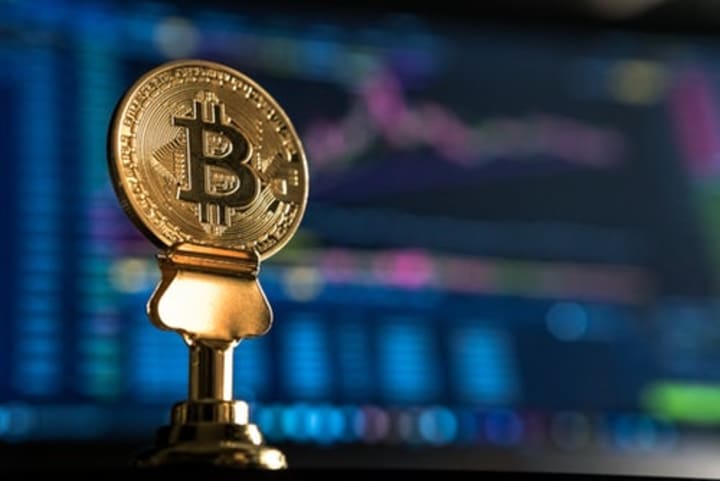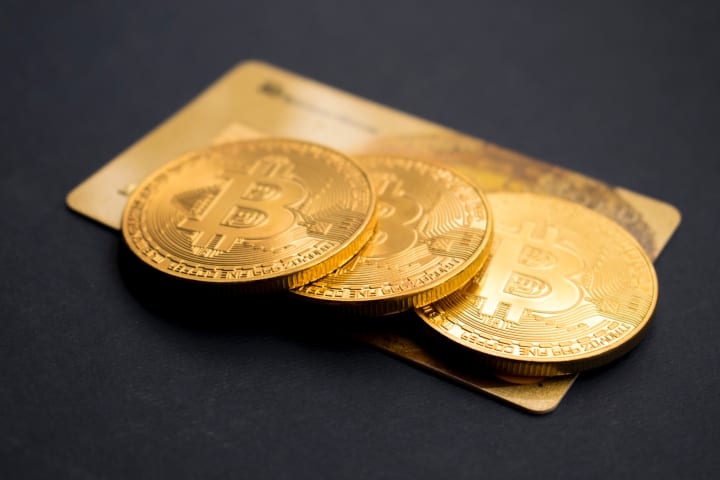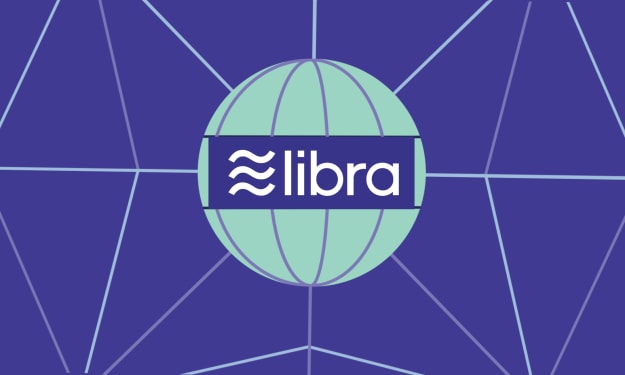Are Bitcoin Bank Accounts Feasible?
If you're into cryptocurrencies, you've probably asked yourself, "Are Bitcoin bank accounts feasible?"

Can you picture a future where you open your PNC app to check your checking account, but you do not have one because you decided to convert all your money to cryptocurrency? All you do instead is check the Bitcoin price today, and then pay your bills.
One question that has been raised regarding the future of cryptocurrencies is: Are Bitcoin bank accounts feasible? When I say Bitcoin bank accounts in this situation, I am talking about being able to store any type of cryptocurrency or virtual currency into your regular bank account, or even a specific bank account created for virtual currencies at a traditional bank. I picture it being like a money market account. What about a Bitcoin debit card, where you can swipe to purchase coffee with your cryptocurrency of choice?
Let's talk about the major differences between traditional banking and Bitcoin banking. Bitcoin is a cryptocurrency; and therefore, its use of decentralized systems is innately opposite to that of traditional currency. With cryptocurrencies, no single, central bank is in control, as it is with traditional currencies.
Bitcoin, the first truly successful cryptocurrency, was created in 2009; therefore, we do not know what the long-term successes, failures, and potential issues will be. There were virtual currencies created before Bitcoin, but obviously, they did not have the same success.
There are two main types of people who purchase Bitcoins: Those who want to buy Bitcoins to invest in them, and those who want to be in control of their money without a bank or anyone else knowing the details of their financials and transactions. One of the benefits of buying Bitcoins is that a bank cannot freeze or withhold your money because it is not stored in a bank, and you don't need a bank to know how to trade cryptocurrencies. In the past, those who wanted some kind of secrecy in terms of their money would look to an offshore account, but cryptocurrencies prove a much easier option.
As of now, you cannot store Bitcoin in a traditional bank.

There have been rumors that Goldman Sachs is planning to open a Bitcoin trading desk; however, that has not happened yet. That is not really what we are talking about though.
Bitcoin has its own "bank." Currently, when you purchase Bitcoin or any other type of cryptocurrency, you will keep it in a coin wallet, such as Coinbase, a blockchain network, The Cloud, a desktop wallet, or even in a paper wallet (which some people may not realize is an option). Transactions take place online, in the blockchain, rather than through a company like Visa. These large companies like Visa or Discover actually have the capability to process many more transactions per second than Bitcoin.
However, Bitcoin is trying to catch up with features like Lightning Network. Lightning Network allows users to easily transfer payments through a channel, back and forth to one another, before the channel closes and those payments need to be entered in blockchain. Lightning Network allows Bitcoin to process more payments than it could before. This feature demonstrates that Bitcoin is trying to compete with big banks and widen its capabilities.
Bitcoin bank accounts would be a big change from the way cryptocurrency is stored right now, but that does not mean that it will not happen. One of the suspicions, when it comes to putting virtual currency in a bank account, would be concern of banks or the government being able to control or regulate it. The United States government, as well as other countries' governments, does not want us to have any unregulated currency.
The benefit of keeping your money in a bank account is that the bank backs up your money, but since Bitcoin is not considered a "real" currency, it would not be backed by the bank. This begs the question, would your money be more secure in a bank compared to an app?
Why would someone want a Bitcoin bank account?

For those who simply purchase Bitcoin as an investment, a bank might seem like the right way to go. Some who invest in Bitcoin might feel more secure putting their coins into a bank account, rather than just keeping them in their Bitcoin wallet (and, believe me, the reasons you should buy a ledger wallet for your crypto are paramount). The incentive to put your coins in a bank account would be to avoid hackers breaking into your online wallet and stealing your coins, and the added security of being able to insure it.
It is natural to feel like your money is more secure in a bank, with the bank's ability to back it up if it were to be stolen. Unfortunately, right now, banks do not insure Bitcoin. Whether you put Bitcoin into a bank account or not, it will still not be backed by the FDIC. Coinbase does not back money stored in personal accounts, either. Realistically, nobody insures Bitcoin at this point.
Bitcoin banks would be a huge deal for Bitcoin owners. As of now, if your Bitcoin is stolen, you are not likely to get it back. There is a 20 percent recovery rate for Bitcoin thefts. Most thefts go unreported because owners know the slim chance they have of getting their money back. This is an issue for Bitcoin owners, nobody is going to want to convert all their money to Bitcoin if it cannot be backed. However, if customers were actually able to have their Bitcoin insured, I think they would be very interested in Bitcoin banks. With the way things are going right now, it is hard to picture that happening.
Keeping your money out of banks keeps you in control.

Banks can regulate access to your money. They have the ability to freeze your account, and lock you out. One of the benefits of cryptocurrencies is that they are not obligated to follow the rules of traditional currencies, so taking that currency and putting it into a bank seems a little counterintuitive, depending what your motives are. So for those who want that control a Bitcoin bank account would not be attractive to them.
As of now, banks do not want their customers to own Bitcoin, if they have any say in it. Customers have complained about banks freezing their accounts due to them purchasing Bitcoin with their money from their bank account.
Big banks, including Bank of America, JP Moragan, and Discover, have already banned users from using their credit cards to purchase cryptocurrency. Bitcoin, because it is virtually untraceable, is often used to fund illegal activity. Banks do not want to be involved in this. These banks have prohibited users from using their credit cards, or the money from their bank accounts, to purchase Bitcoins. This, obviously, would never happen if you had your money in a coin wallet. Did you know that there are actually several countries where Bitcoin is illegal?
If there were Bitcoin banks, you would theoretically be able to make crypto-exchanges from your account without it being traced. However, I do not foresee banks allowing that.
Since banks make money off of customers keeping their money in the bank, it would be beneficial for banks to allow customers to store Bitcoins in a bank account, considering there is a lot of money in Bitcoin right now. They might as well be benefiting from all of those Bitcoin transactions.
There would need to be a large change for Bitcoin banks to be a reality the future.

The main benefit I can see to keeping your Bitcoin in a traditional bank would be if banks insured your Bitcoin. I think there would be a potential market for that. Insurance on Bitcoin would be extremely expensive, due to its high volatility, which is why cryptocurrency wallets do not insure coins either.
Although I find it hard to envision right now, who knows what will happen in the future? The fact is, Bitcoin's value fluctuates like the stock market because of how world fiat money affects Bitcoin price, so if it does completely crash, it is possible that Bitcoin might not even have a future.
But what if banks actually take over cryptocurrency, like moms on facebook?

Image via Unsplash
JP Morgan is working on its own bank-baked cryptocurrency. This is probably not what you think. Because big banks wire money countless times everyday, JP Morgan created the JPM Coin, which will eventually replace wire transfers. So although banks do not approve of their customers using Bitcoin, they want to use it for themselves. If big banks did start allowing users to store their Bitcoin in bank accounts, it would certainly be a lot more regulated than it is now, and could prove to be a cash cow for big banks that have the clout to value cryptocurrencies.
There can be only one... or can there?
The reality is, there are so many what-ifs that right now, all we can do is speculate about the question, "Are Bitcoin bank accounts feasible?" The way I see it, there will be one winner. Either banks will continue to refuse to allow customers to purchase Bitcoin with their credit, or banks will try to take over altogether. If Bitcoin banks did exist, Bitcoin would not be the free-for-all that it is now. They would find a way to put more rules and regulations in place. Of course there will be those who resist and do not want to put their virtual currency into a bank, but all banks wouldn't change as a result of these new practices, and would be a storage place for all types of currencies.
The way things are right now, traditional banks and cryptocurrencies are not compatible for transactions. If banks and cryptocurrencies were to adapt to become more compatible with one another, we might have a system that can work.
The next question is: "Where will the merge of traditional banks and cryptocurrencies begin?"
About the Creator
Ringo Mendoza
Wants to be a DJ but too anxious. Spends too much time on social media and can name most cheese by smell alone, for some reason.






Comments
There are no comments for this story
Be the first to respond and start the conversation.